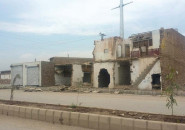Resource guzzlers: Plot afoot to stop exposure of ‘ill-planned’ projects
Forces in Planning Commission once again at work to stop PM's Inspection Commission from investigating them.

Resource guzzlers: Plot afoot to stop exposure of ‘ill-planned’ projects
The Inspection Commission has summoned members of the Planning Commission on Tuesday to give a briefing on five strategically important projects worth billions of rupees.
However, these schemes have become classic examples of faulty planning and a permanent burden on the exchequer. The Planning Commission either will not send its team or it will send junior officials to the PM Secretariat, The Express Tribune has learnt. Certain elements have been resisting the scrutiny of the public sector development programmes and fighting tooth and nail to evade the planned briefings, said sources close to the Deputy Chairman Planning Commission.
The PM’s Inspection Commission has asked for briefings on December 21 to 23. The approval of 32 new projects worth Rs617 billion at a time of financial crunch invoked the PM’s Inspection Commission to seek explanation for the decision. The government has recently slashed the public sector development budget by half. The new figure of Rs140 billion is not even sufficient for financing ongoing projects costing Rs3.2 trillion, the equivalent of this year’s federal budget.
Every effort is being made to stop the Inspection Commission from finalising its inquiry report which will be submitted to the prime minister before December 31.
Prime Minister Yousaf Raza Gilani has approved the inspection of five projects, namely Rainee Canal, Neelum Jhelum hydropower project, Expanded Programme on Immunization, Naltar hydropower project and national programme for improvement of watercourses.
These projects are falling behind schedule, resulting in price escalation, and in one case, in losing waters to India.
The Neelum Jhelum project is three years behind the schedule that will result in loss of waters to India which is building Kishanganga dam and likely to complete in 2015 – four years before Pakistan. Despite increase in the cost of watercourses programme from Rs66 billion to almost Rs90 billion the watercourses project is also lagging behind on key targets. The Rainee Canal project cost too has also escalated from Rs18 billion to Rs42 billon.
The elements are taking the plea that implementation and monitoring wing of the Planning Commission is already monitoring the work on the projects so the Inspection Commission’s work will be nothing but duplication,” said the sources.
This is the second such attempt to hide the inefficiency and ill-planning of the Planning Commission. During the last financial year the Inspection Commission also attempted to scrutinise ten strategically important projects which were facing delays and their cost surged manifolds.
According to official documents, the then Deputy Chairman Planning Commission Sardar Assef Ahmad Ali refused to cooperate with the Inspection Commission. “The Deputy Chairman PC has shown his absolute inability to cooperate with the PMIC and has also instructed the Planning and Development Division not to exchange any information with the PMIC”, reveals the documents.
It further states, the Planning Commission has approved “the most ill-conceived projects, executed for 3-4 years then revised after having spent billions and still face serious shortcomings besides delays which cumulatively cost the exchequer hundreds of billions of rupees”.
Published in The Express Tribune, December 21st, 2010.


















COMMENTS
Comments are moderated and generally will be posted if they are on-topic and not abusive.
For more information, please see our Comments FAQ